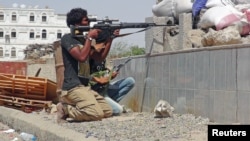Yemen's Shi'ite rebels and their allies consolidated their hold in another part of the southern port city of Aden on Wednesday after heavy fighting with militiamen loyal to the exiled government and capturing the area's presidential palace, officials said.
The latest advance by the rebels, known as Houthis, and their allies, loyalists of former president Ali Abdullah Saleh, showed they are still capable of fighting despite Saudi-led airstrikes.
The rebels took Aden's southwestern Tawahi district, killing the area's military commander, Maj. Gen. Ali Nasser al-Hassani, in the process and seizing the palace, military officials said.
U.S. forces once used the palace, which overlooks the city's port entrance, as an operations center and training facility for anti-terrorism forces after rebels captured the capital last September, they said. Experts and trainers left this spring when clashes began in Aden.
Meanwhile, security officials said airstrikes continued throughout the country, killing dozens of rebels and their allies. They spoke on condition of anonymity as they weren't allowed to brief journalists.
The U.N. human rights office says at least 646 civilians have been killed in the conflict in Yemen since the airstrikes began March 26. President Abed Rabbo Mansour Hadi's government in exile in Saudi Arabia puts the civilian death toll at least 1,000. At least 300,000 Yemenis have been displaced.
In Riyad, Yemeni Foreign Minister Riad Yassin urged the international community to intervene to rescue civilians he said deliberately were targeted by the Houthis.
"We appeal coalition forces to do all they can as soon as possible to salvage Aden," he said, adding that any negotiations over the country's future could not include Saleh or members of his family.
U.S. Secretary of State John Kerry said he hopes to secure a pause in the war as he prepared for Thursday talks in Saudi Arabia. At a news conference in Djibouti, a nearby African nation that already has taken in several thousand Yemenis, Kerry said the United States was deeply concerned by increased shortages in Yemen of food, fuel and medicine.
Yemen's Shi'ite Rebels Take Neighborhood in Aden, Occupy Palace

SANAA, YEMEN —



